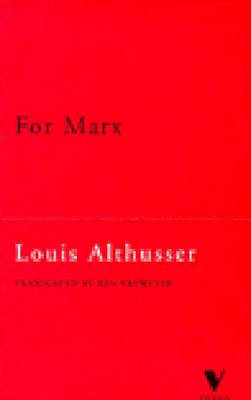Verso Classics
1 primary work • 2 total works
Book 14
Together with Louis Althusser's book "For Marx," "Reading Capital" represents one of the foundational texts of the school of "structuralist Marxism" which transformed the face of modern philosophy and social theory. Presided over by the magnetic and intellectually coruscating figure of Althusser, the structuralist Marxists attempted no less than an intellectual revolution against dominant interpretations of Marx. Seeking to cleanse Marx of all Hegelian impurities and recast his thought on a rigorously scientific basis, in this work Althusser and one of his most brilliant students and colleagues, Etienne Balibar, subjected Marx's method in "Capital," his critique of classical political economy, and the fundamental terms of historical materialism, to searching textual analysis and challenging conceptual reconstruction. Inaugurating a new way of reading Marx that was to prove both intensely stimulating and capable of generating fierce controversy, Reading Capital is a work that cannot be bypassed by anyone interested in Marxism, and in theory more generally, in this century.
The publication of "For Marx" in 1965 established Louis Althusser as an original and controversial Marxist philosopher. It contains Althusser's polemic revaluation of Marx's early works, his essay on "Contradiction and Overdetermination" and other articles on philosophy, ideology and aesthetics. Other works by Louis Althusser include "Reading Capital", "Montesquieu", "Rousseau and Marx" and "Essays in Ideology". The book has come to be regarded as the founding text of the school of "structuralism Marxism" which was presided over by the enigmatic figure of Louis Althusser. Structuralism constituted an intellectual revolution in the 1960s and 1970s, and radically transformed the way philosophy, political and social theory, history, science and aesthetics were discussed and thought about. The book was a key contribution to that process and it fundamentally recast the way in which many people understood Marx and Marxism.
The book contains the classic statements of Althusser's analysis of the young Marx and the importance of Feuerbach during this formative period, of his thesis of the "epistemological break" between the early and the late Marx, and of his conception of dialectics, contradiction and "overdetermination". Also included is a study of the materialist theatre of Bertolazzi and Brecht and the critique of humanist readings of Marxism. Since his death in 1990, Althusser's legacy has come under renewed examination, and it is increasingly recognized that the influence of his ideas has been wider and deeper than previously thought.
The book contains the classic statements of Althusser's analysis of the young Marx and the importance of Feuerbach during this formative period, of his thesis of the "epistemological break" between the early and the late Marx, and of his conception of dialectics, contradiction and "overdetermination". Also included is a study of the materialist theatre of Bertolazzi and Brecht and the critique of humanist readings of Marxism. Since his death in 1990, Althusser's legacy has come under renewed examination, and it is increasingly recognized that the influence of his ideas has been wider and deeper than previously thought.

